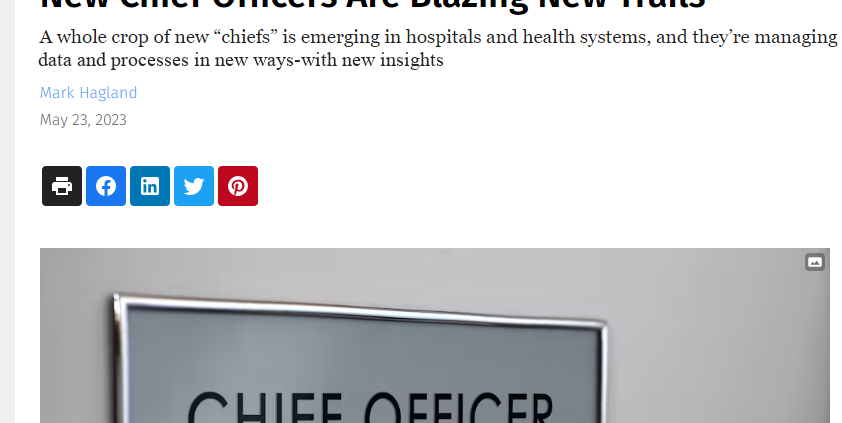Healthcare Innovation – New Chief Officers Are Blazing New Trails
Pam Arlotto is quoted in a May 23rd, 2023 article, by Mark Hagland, in Healthcare Innovation.
Below is an excerpt of the article.
Want to follow the trajectory of change around data analytics in healthcare? Just converse with Oscar Marroquin, M.D., who in September 2011 was named vice president, clinical analytics in the Health Services Division at the 40-hospital UPMC health system in Pittsburgh, and who in July 2017 was named the Health Services Division’s chief clinical analytics officer, and then who in July 2020 was then named chief healthcare data and analytics officer for the entire UPMC health system (which encompasses both the provider side of the organization, the Health Services Division, and the UPMC Health Plan).
Marroquin’s professional trajectory (and Marroquin still practices clinically 20 percent of his time, as a cardiologist) reflects the growing ascendancy of data analytics, especially clinical data analytics, in healthcare. Since he began spending a considerable proportion of his time leading data analytics work, Marroquin says, “Given that I had already overseen how we used our clinical data and had done analytics in that space, we had a pretty clear vision that this current role needed to be expanded so that I could have more oversight as to how we managed the whole stack of data.” In fact, he says, “In order to do analytics, you need to manage your data efficiently, and to govern your data efficiently.”
Marroquin notes that the data analytics journey at UPMC has evolved forward organically, with a focus in their case first on analyzing clinical data to improve clinical performance. Nevertheless, he notes, “The COVID-19 pandemic changed everything. My expansion of the role began at the beginning of COVID; COVID has transformed everything. And one of the things to note is that, yes, while we are very much aligned in the direction we wanted to go when we expanded the role, there’s still a lot of change management and organizational alignment that has to happen to achieve the goals envisioned.” And he adds that “By consensus, our organization has been gravitating more and more towards this single-source-of-truth concept, displacing having multiple teams working on things. So there’s much more of an agreement on what the gold standard of truth will be. And as a result, the organization is able to function more efficiently without multiple reports, etc. And whether those resources are people or IT processes and computing power, we’re not duplicating processes. I would put that at the top.”
What’s happened at UPMC mirrors activity across the U.S. healthcare delivery system; the leaders of patient care organizations, seeking to improve the outcomes quality and cost-efficiency of care delivery, have found that they needed to create new roles to help lead their organizations forward in key areas: thus the titles chief data officer, chief analytics officer, or, in the case of UPMC, chief data and analytics officer; as well as chief digital officer, and further afield, chief innovation officer, and even chief value officer (see sidebar). What common patterns are emerging?
“What’s happening with all of these new roles is following the pattern of how the CIO and CMIO roles emerged and evolved forward decades ago,” – Pam Arlotto
Indeed, says Pam Arlotto, CEO of the Atlanta-based consulting firm Maestro Strategies, “What’s happening with all of these new roles is following the pattern of how the CIO and CMIO roles emerged and evolved forward decades ago,” as specific needs then and now have prompted the creation of new roles. Just as when the implementation of large, complex electronic health record (EHR) systems propelled forward the CMIO role, and later, the need for improved clinical performance elevated that role, these chief data and chief analytics officer roles are being summoned by the performance needs of the present moment. There is also the chief digital officer role, which as she notes, is more about the need to govern processes that will respond to increasing consumerism and consumer awareness among patients and families. (continued..)
Download PDF of article: New Chief Officers Are Blazing New Trails _ Healthcare Innovation




